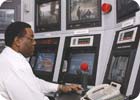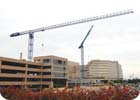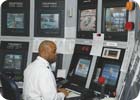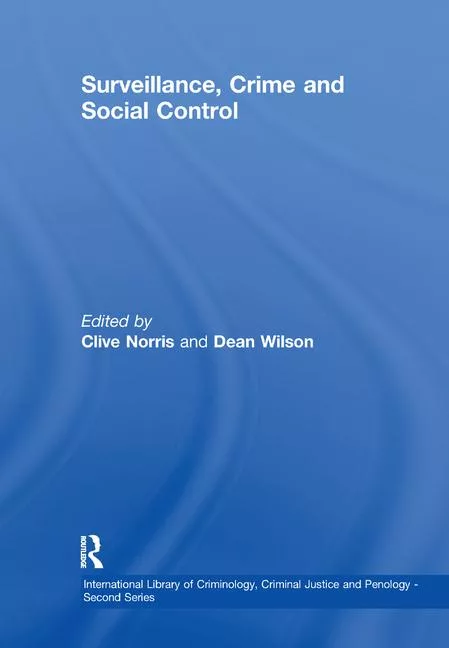My Turn: Award-Winning Access Control
Tony Potter is the director of public safety at Forsyth
Medical Center
located in Charlotte, N.C.
Forsyth is an 847-bed not-for-profit regional medical center that coupled with
the nearby 136-bed Medical Park
Hospital, is one of the largest,
best-equipped hospital facilities in the state. Security Magazine recently
interviewed Potter about Forsyth’s latest badging and access control system.
Security Magazine: What made you decide on making the access control system upgrade?
Potter: We went to Secure Perfect as an access control system, with badging, in 2004. The facility was totally converted to Secure Perfect by the end of 2004. We realized that we were not even scratching the surface of the system’s capabilities, that is, using it as an integration platform for other systems. We are still in the process of integrating. Being a hospital, integration must be done incrementally.
The facility had 35 cameras when I started in July 2003, and has since expanded to 140, with space to increase to 300, hopefully by the end of 2008. There are now cameras where they weren’t before. Also, security is being designed into new facilities, which increases effectiveness and reduces cost. A retrofit is two times the cost and is less effective.
Security used to be an afterthought. We are currently working on a 1,427 car, five-level garage, a new conference center and a nine-story patient tower. Security is a design consideration. All infrastructures are in the architect’s drawings, and the contractor installs accordingly. The new parking garage is using “pre-tension” concrete; drilling will affect the structural integrity. All security must be designed prior to building. We know where everything needs to be in the nine-story tower, including wiring, readers and cameras.
Security Magazine: What kinds of equipment is the facility using?
Potter: Proximity cards are used for access control. Cards have photo, name, credentials, hospital logo and one of eight different colors to help designate different types of people. There are 4,700 employees at this location. Also, a different background is used to indicate the year the photo was taken. An ID photo is good for five years.
Some specific, higher security areas require both the card and keypad. The pharmacy includes a duress code so that if an employee is forced to open the pharmacy he can key in a duress code, which will notify police and security will respond.
Communications technicians are trained and on staff 24/7. They monitor security video, access control and are also the dispatcher. We have “panic alarms,” and premises or intrusion alarms, which are used in areas such as cashiers or behavioral health where an emergency might develop. Strobe lights on the console light up if the alarms are triggered. This was installed so that there is no chance of missing the alarm.
Security Magazine: What problems have arisen, and how have they been handled?
Potter: There have been a number of alarm and camera situations. Last year, we installed five new cameras in receiving (one PTZ, four fixed). Three weeks later, two suspicious persons were spotted as they grabbed goods, mostly computer equipment, that totaled $23,000 in value. The cost of the new camera system was $18,000. We recouped the cost of system in less than three weeks. However, cameras don’t replace people, they augment them.
Also, two young men were caught breaking into employees’ cars and we were able to give the police a CD with which they could pursue and prosecute. We use Wavereader, which is also installed on all executive systems so we can view the hospital off-campus, if necessary.
A female prisoner was brought to the hospital by a police officer and she subsequently accused the police officer of improper conduct. The hospital produced a CD of events, which later exonerated the police officer.
Security Magazine: What is the vision for the future?
Potter: The hospital is growing rapidly. There is a $249 million capital expansion campaign, which is “Vison 2010” – the goal is to double in size by 2010.

 According to a
Forsyth Medical Center spokesperson, “Forsyth Medical Center (FMC) has been
recognized for its security and safety programs by the International Association
for Healthcare Security and Safety. The organization awarded FMC's Public
Safety Department its 2006 Lindberg Bell Award recognizing the medical center’s
innovation and measurable improvement in facility safety and security.”
According to a
Forsyth Medical Center spokesperson, “Forsyth Medical Center (FMC) has been
recognized for its security and safety programs by the International Association
for Healthcare Security and Safety. The organization awarded FMC's Public
Safety Department its 2006 Lindberg Bell Award recognizing the medical center’s
innovation and measurable improvement in facility safety and security.”

Security Magazine: What made you decide on making the access control system upgrade?
Potter: We went to Secure Perfect as an access control system, with badging, in 2004. The facility was totally converted to Secure Perfect by the end of 2004. We realized that we were not even scratching the surface of the system’s capabilities, that is, using it as an integration platform for other systems. We are still in the process of integrating. Being a hospital, integration must be done incrementally.
The facility had 35 cameras when I started in July 2003, and has since expanded to 140, with space to increase to 300, hopefully by the end of 2008. There are now cameras where they weren’t before. Also, security is being designed into new facilities, which increases effectiveness and reduces cost. A retrofit is two times the cost and is less effective.
Security used to be an afterthought. We are currently working on a 1,427 car, five-level garage, a new conference center and a nine-story patient tower. Security is a design consideration. All infrastructures are in the architect’s drawings, and the contractor installs accordingly. The new parking garage is using “pre-tension” concrete; drilling will affect the structural integrity. All security must be designed prior to building. We know where everything needs to be in the nine-story tower, including wiring, readers and cameras.
Security Magazine: What kinds of equipment is the facility using?
Potter: Proximity cards are used for access control. Cards have photo, name, credentials, hospital logo and one of eight different colors to help designate different types of people. There are 4,700 employees at this location. Also, a different background is used to indicate the year the photo was taken. An ID photo is good for five years.
Some specific, higher security areas require both the card and keypad. The pharmacy includes a duress code so that if an employee is forced to open the pharmacy he can key in a duress code, which will notify police and security will respond.
Communications technicians are trained and on staff 24/7. They monitor security video, access control and are also the dispatcher. We have “panic alarms,” and premises or intrusion alarms, which are used in areas such as cashiers or behavioral health where an emergency might develop. Strobe lights on the console light up if the alarms are triggered. This was installed so that there is no chance of missing the alarm.
Security Magazine: What problems have arisen, and how have they been handled?
Potter: There have been a number of alarm and camera situations. Last year, we installed five new cameras in receiving (one PTZ, four fixed). Three weeks later, two suspicious persons were spotted as they grabbed goods, mostly computer equipment, that totaled $23,000 in value. The cost of the new camera system was $18,000. We recouped the cost of system in less than three weeks. However, cameras don’t replace people, they augment them.
Also, two young men were caught breaking into employees’ cars and we were able to give the police a CD with which they could pursue and prosecute. We use Wavereader, which is also installed on all executive systems so we can view the hospital off-campus, if necessary.
A female prisoner was brought to the hospital by a police officer and she subsequently accused the police officer of improper conduct. The hospital produced a CD of events, which later exonerated the police officer.
Security Magazine: What is the vision for the future?
Potter: The hospital is growing rapidly. There is a $249 million capital expansion campaign, which is “Vison 2010” – the goal is to double in size by 2010.

SIDEBAR: Rewarding Reactions
The Forsyth Medical Center has been the recipient of the 2006 Lindberg Bell Award, which is the International Association for Healthcare Security and Safety’s annual award presented to a healthcare facility that has demonstrated an exceptional security and/or safety program.

Looking for a reprint of this article?
From high-res PDFs to custom plaques, order your copy today!




